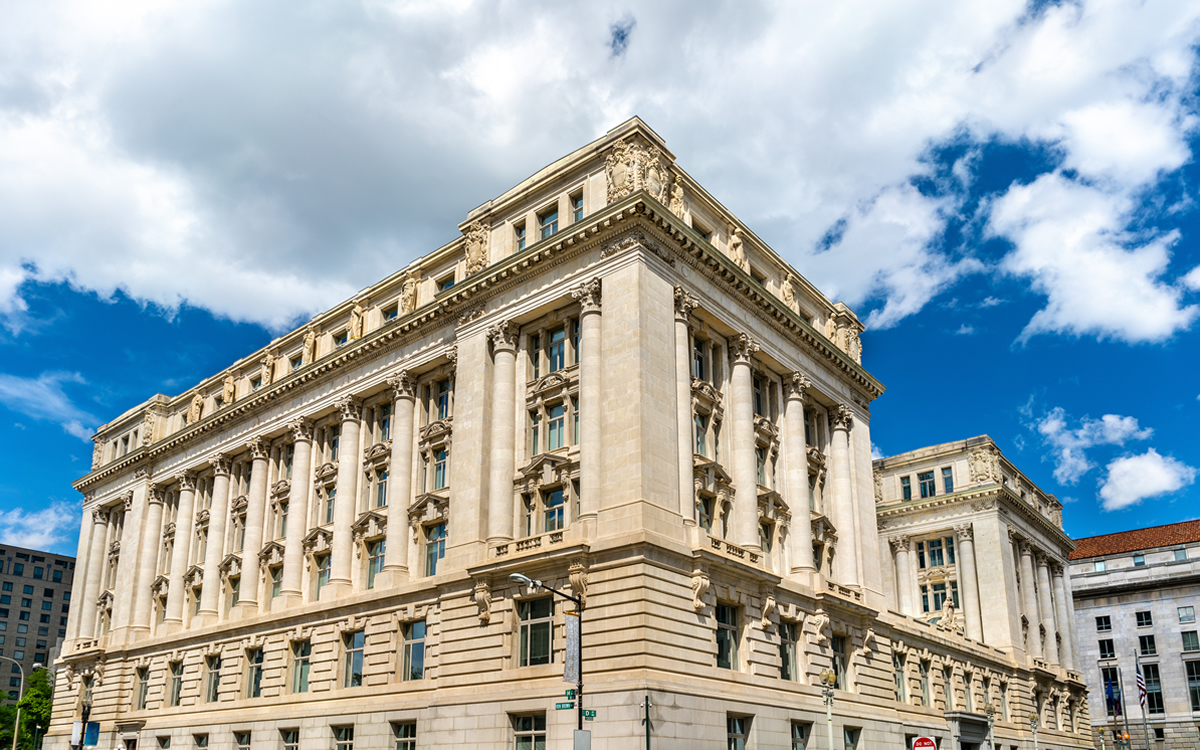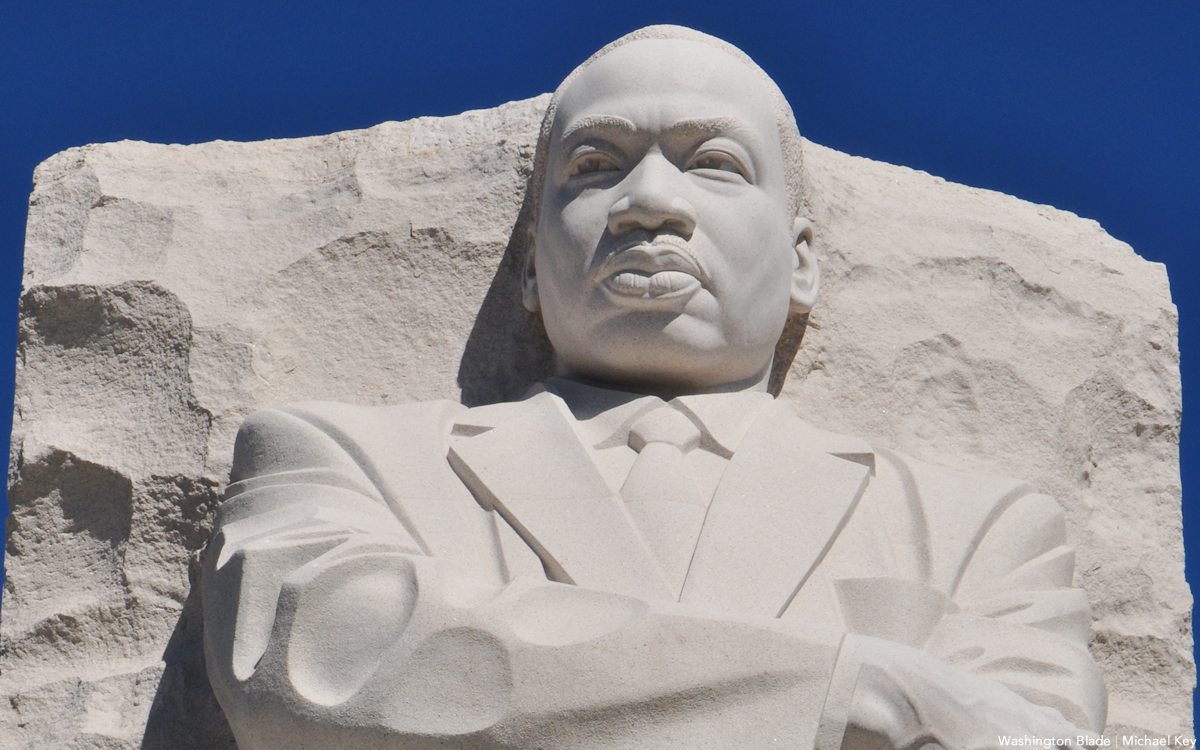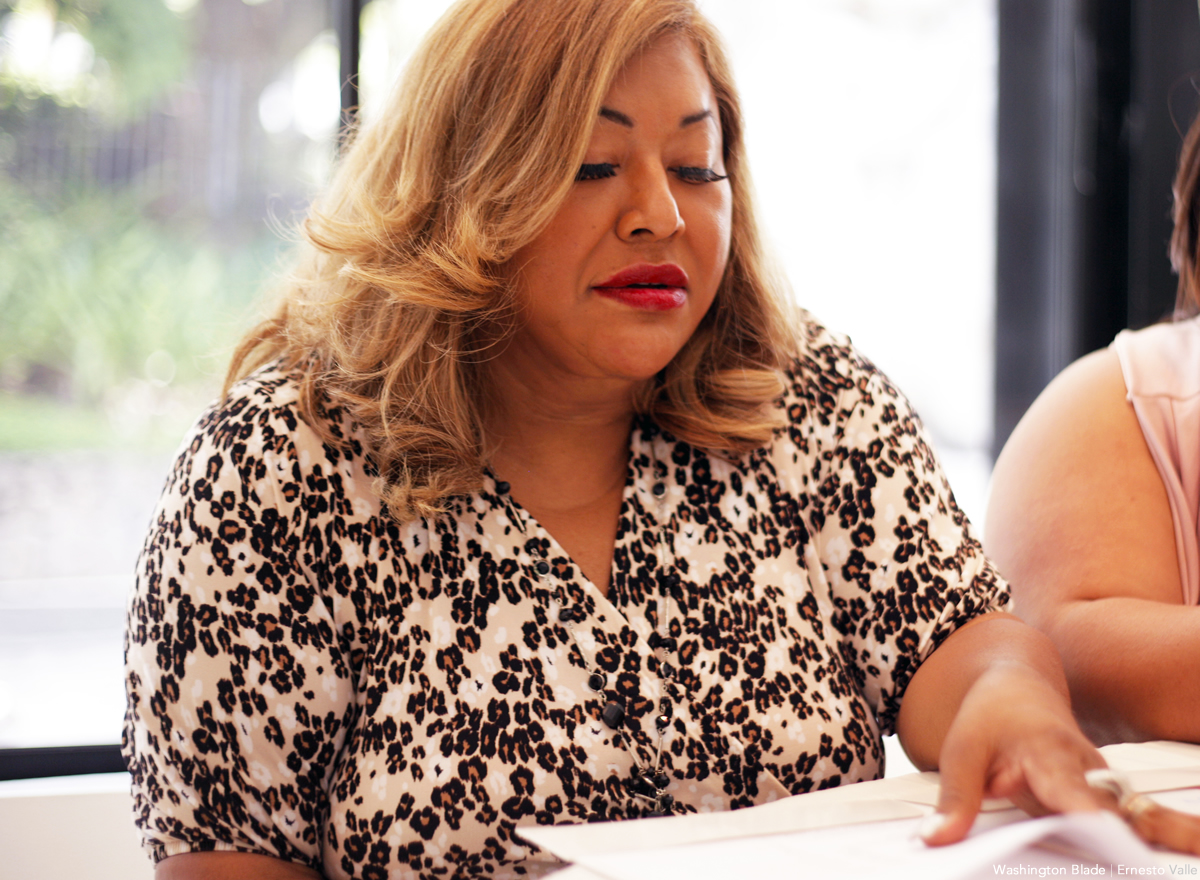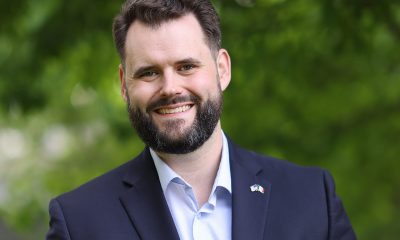District of Columbia
Activists fight to protect LGBTQ services in D.C. budget
LGBT Budget Coalition leading effort

As temperatures rise in Washington, so does the pressure on the D.C. government to pass a budget for the 2026 financial year.
The Washington Blade followed up with Heidi Ellis, coordinator of the DC LGBT Budget Coalition, to discuss progress made — and the steps still needed — to ensure Washington’s LGBTQ community remains a priority for the D.C. Council and Mayor Muriel Bowser’s office.
Asked about the current state of the budget, Ellis was clear: the dust hasn’t settled. The process is still unfolding. Still, she shared that the overall city budget has been cut.
“There was a large cut in the mayor’s budget for Financial Year 2026 — over a million dollars,” Ellis said. “We took a hit of over $6 million in this in the city due to the federal funding cuts.”
According to Ellis, the cuts are due in large part to declining local tax revenue and a Republican-controlled federal government that has shown little support for LGBTQ-specific funding.
“The biggest challenge is the city is in a different place financially,” Ellis said. “The city’s CFO has now had two years plus in a row of forecasts of lower revenue for the city in general, and then we had congressional interference when they cut a billion dollars out of our budget — that still has not been resolved on the federal level. That happened during the continuing resolution on the Hill to pass like their spending bill, which has not been resolved. The mayor had to essentially cut a billion dollars out of the FY 25 budget to make it balanced. That was huge, and then the city is looking at lower revenue over the next couple of years.”
Although the entire city faces challenges, Ellis said the intersectional needs of LGBTQ residents — especially those who are Black, brown, low-income, or otherwise marginalized — demand specific, equitable funding.
“Whatever issues the city has, whether it be housing instability, food insecurity, safety issues, they are always exacerbated when you think about it through the lens of queer people — specifically Black and brown queer folks and folks that are low to no income,” she said. “So the folks that are living at the margins of our community are always going to feel whatever is happening 10 times more. And this administration has brought in a lot of consternation and fear to the city.”
Still, despite the broader financial setbacks, there have been some “wins.”
Ellis named five of the 12 sitting council members who have stepped up to support the goals outlined by the LGBT Budget Coalition: Council Members Matthew Frumin, Christina Henderson, Brianne Nadeau, Zachary Parker, and Robert C. White, Jr.
Each of these members has offered support through their committee work — addressing areas from healthcare to homelessness.
Parker, the council’s only gay member, helped fight for expanded funding for the youth homelessness continuum. A 2024 study found that 40 percent of unhoused youth in D.C. identify as LGBTQ.
Frumin has advocated for additional funds for transgender workforce programs, the youth homelessness continuum, and the D.C. Department of Human Services, which provides critical support for low-income residents.
Henderson backed the LGBT Budget Coalition’s healthcare and HIV-related goals by pushing for expanded hours at the D.C. Health and Wellness Center.
“She’s actually recommending now that they be open on one week night and then two Saturdays a month,” Ellis said. “That’s a huge win, because that allows for more people to access that care.”
Nadeau championed continued funding for the Mayor’s Office of LGBTQ Affairs, which provides $1 million annually in grants to LGBTQ organizations. White advocated for sustaining support for trans workforce programs like Project LEAP, which connects gender-diverse residents with job coaches and employers to build long-term economic stability.
“So far I would say we’ve gotten about four out of the seven to eight things we asked for fulfilled,” Ellis explained. “We were able to get a good chunk of that back to restore some services — like permanent supportive housing and extended transitional housing.”
Ellis emphasized that the LGBT Budget Coalition’s success stems in part from community engagement and platforms like the Blade.
“We launched the letter writing campaign back in April that generated thousands of letters that went directly to the mayor and the council. It was literally folks just signing up and saying, ‘We support this,’ and it automatically created letters. It was a major organizing tool.”
“We did an op-ed in the Blade that ran both in the print and in the online version — that got a lot of traction. Our coalition members have been pushing out what the needs are through their social media and have been testifying before the council through the oversight hearings and the budget hearings. And remember — we just had WorldPride. We reminded them [council members], you all are coming out and waving the flag and taking photo ops for our community, you can’t do that in one breath and then take away our funding.”
Still, critical needs remain unmet — particularly around HIV healthcare funding.
“The HIV funding just continues to close the gap,” Ellis said. “That’s the one that it’s such a big gap that even with the great work of Council Member Henderson is not enough. She even highlighted in her committee report that she’s asking for the Committee of the Whole, which is the whole council, to supplement some of that funding — understanding just how much of a loss we took. The gap is still wide and needs additional funding.”
Beyond HIV-related services, Ellis noted several key areas that still require urgent attention in the final version of the budget. Among them: restoring the D.C. Emergency Rental Assistance Program, which provides housing stability for the city’s most vulnerable; reforming the Tenant Opportunity to Purchase Act to better support tenant-led housing solutions; and restoring funding for LGBTQ mental health services, which have faced significant cuts in recent years.
The coalition is also pushing for the continued support of LGBTQ+ services administered through the Mayor’s Office of LGBTQ Affairs, including a $450,000 allocation for the Violence Prevention and Response Team initiative. In addition, Ellis emphasized the need for full enforcement of the city’s Language Access Act — and for its expansion to ensure Americans with Disabilities Act compliance, making D.C. services more inclusive for all residents.
Ellis acknowledged the political climate may feel daunting, but pointed to the resilience of the LGBTQ community — both historically and today.
“It’s just a constant reminder that we have been here before,” Ellis said. “We had the Lavender Scare. We had Stonewall. We had the AIDS epidemic. This community has gone through peril, and it continues around me how resilient we are — and actually not just resilient for the sake of being resilient, but that we actually build. We don’t just survive, but we build. I would say that the city has taken a hit, and we’re all trying to figure out how best to move forward and not lose our values.”
She added that while the LGBT Budget Coalition is united in its platform, it does not claim to speak for every LGBTQ person in D.C.
“The coalition is a voice that is united because we wanted to make sure we walk in lockstep, but we do not represent all of the LGBTQ community. We know there’s many factions. We are multifaceted as a community, but we do have a wide range of folks represented in our coalition, and we do our best to advocate with a wider lens and also make sure that we’re thinking about the most marginalized folks in our community. I just wanted to clarify where we enter this process, and I would just say that we’re going to continue to fight. It’s Pride month. It’s crazy that we’re going back to some of these original arguments around humanity, and whether we’re worth this dollar amount, but that’s where we are. But we’re not giving up. So I would just encourage everybody not to give up and get involved where they can get involved.”
When asked how individuals can support the LGBT Budget Coalition’s goals, Ellis had a clear answer: speak up.
“I would just argue for folks to email their council members and call their council members to show up. Just letting them know that you support funding of key services for LGBTQ folks. You don’t have to be part of our coalition to do that. These issues intersect; housing is an issue for all, healthcare is an issue for all. We’re just asking for it to be equitable.”
District of Columbia
D.C.’s annual MLK Peace Walk and Parade set for Jan. 19
LGBTQ participants expected to join mayor’s contingent

Similar to past years, members of the LGBTQ community were expected to participate in D.C.’s 21st annual Martin Luther King Jr. Day Peace Walk and Parade scheduled to take place Monday, Jan. 19.
Organizers announced this year’s Peace Walk, which takes place ahead of the parade, was scheduled to begin at 10:30 a.m. at the site of a Peace Rally set to begin at 9:30 a.m. at the intersection of Firth Sterling Avenue and Sumner Road, S.E., a short distance from Martin Luther King Jr. Avenue.
The Peace Walk and the parade, which is scheduled to begin at 11 a.m. at the same location, will each travel along Martin Luther King Jr. Avenue a little over a half mile to Marion Barry Avenue near the 11th Street Bridge where they will end.
Japer Bowles, director of D.C. Mayor Muriel Bowser’s Office of LGBTQ Affairs, said he and members of his staff would be marching in the parade as part of the mayor’s parade contingent. In past years, LGBTQ community members have also joined the mayor’s parade contingent.
Stuart Anderson, one of the MLK Day parade organizers, said he was not aware of any specific LGBTQ organizations that had signed up as a parade contingent for this year’s parade. LGBTQ group contingents have joined the parade in past years.
Denise Rolark Barnes, one of the lead D.C. MLK Day event organizers, said LGBTQ participants often join parade contingents associated with other organizations.
Barnes said a Health and Wellness Fair was scheduled to take place on the day of the parade along the parade route in a PNC Bank parking lot at 2031 Martin Luther King Jr. Ave., S.E.
A statement on the D.C. MLK Day website describes the parade’s history and impact on the community.
“Established to honor the life and legacy of Rev. Dr. Martin Luther King, Jr., the parade united residents of Ward 8, the District, and the entire region in the national movement to make Dr. King’s birthday a federal holiday,” the statement says. “Today, the parade not only celebrates its historic roots but also promotes peace and non-violence, spotlights organizations that serve the community, and showcases the talent and pride of school-aged children performing for family, friends, and community members.”
District of Columbia
Ruby Corado sentenced to 33 months in prison
Former Casa Ruby director pleaded guilty to wire fraud in 2024

A federal judge on Jan. 13 sentenced Ruby Corado, the founder and former executive director of the now closed D.C. LGBTQ community services organization Casa Ruby, to 33 months of incarceration for a charge of wire fraud to which she pleaded guilty in July 2024.
U.S. District Court Judge Trevor M. McFadden handed down the sentence that had been requested by prosecutors with the Office of the U.S. Attorney for the District of Columbia after Corado’s sentencing had been postponed six times for various reasons.
The judge also sentenced her to 24 months of supervised release upon her completion of incarceration.
In addition to the sentence of incarceration, McFadden agreed to a request by prosecutors to hold Corado responsible for “restitution” and “forfeiture” in the amount of $956,215 that prosecutors have said she illegally misappropriated from federal loans obtained by Casa Ruby.
The charge to which she pleaded guilty is based on allegations that she diverted at least $180,000 “in taxpayer backed emergency COVID relief funds to private offshore bank accounts,” according to court documents.
Court records show FBI agents arrested Corado on March 5, 2024, at a hotel in Laurel, Md., shortly after she returned to the U.S. from El Salvador, where authorities say she moved in 2022. Prosecutors have said in charging documents that she allegedly fled to El Salvador, where she was born, after “financial irregularities at Casa Ruby became public,” and the LGBTQ organization ceased operating.
Shortly after her arrest, another judge agreed to release Corado into the custody of her niece in Rockville, Md., under a home detention order. But at an Oct. 14, 2025, court hearing at which the sentencing was postponed after Corado’s court appointed attorney withdrew from the case, McFadden ordered Corado to be held in jail until the time of her once again rescheduled sentencing.
Her attorney at the time, Elizabeth Mullin, stated in a court motion that her reason for withdrawing from the case was an “irreconcilable breakdown in the attorney-client relationship.”
Corado’s newly retained attorney, Pleasant Brodnax, filed a 25-page defense Memorandum in Aid of Sentencing on Jan. 6, calling for the judge to sentence Corado only to the time she had already served in detention since October.
Among other things, Brodnax’s defense memorandum disputes the claim by prosecutors that Corado improperly diverted as much as $956,215 from federally backed loans to Casa Ruby, saying the total amount Corado diverted was $200,000. Her memo also states that Corado diverted the funds to a bank account in El Salvador for the purpose of opening a Casa Ruby facility there, not to be used for her personally.
“Ms. Corado has accepted responsibility for transferring a portion of the loan disbursements into another account she operated and ultimately transferring a portion of the loan disbursements to an account in El Salvador,” the memo continues.
“Her purpose in transferring funds to El Salvador was to fund Casa Ruby programs in El Salvador,” it says, adding, “Of course, she acknowledges that the terms of the loan agreement did not permit her to transfer the funds to El Salvador for any purpose.”
In his own 16-page sentencing recommendation memo, Assistant U.S. Attorney John Borchert, the lead prosecutor in the case, said Corado’s action amounted at the least to fraud.
“The defendant and Casa Ruby received no less than $1.2 million in taxpayer backed funds during the COVID-19 global health crisis,” he memo states. “But rather than use those funds to support Casa Ruby’s mission as the defendant promised, the defendant further contributed to its demise by unlawfully transferring no less than $180,000 of these federal emergency relief funds into her own private offshore bank accounts,” it says.
“Then, when media reports suggested the defendant would be prosecuted for squandering Casa Ruby’s government funding, she sold her home and fled the country,” the memo states. “Meanwhile, the people who she had promised to pay with taxpayer-backed funds – her employees, landlord, and vendors – were left behind flat broke.”
A spokesperson for the U.S. Attorney’s office and Corado’s attorney didn’t immediately respond to a request from the Washington Blade for comment on the judge’s sentence.
“Ms. Corado accepts full responsibility for her actions in this case,” defense attorney Brodnax says in her sentencing memo. “She acknowledges the false statements made in the loan applications and that she used some of the money outside the United States,” it says.
“However, the money was still utilized for the same purpose and intention as the funds used in the United States, to assist the LGBTQ community,” it states. “Ms. Corado did not use the money to buy lavish goods or fund a lavish lifestyle.”
Brodnax also states in her memo that as a transgender woman, Corado could face abuse and danger in a correctional facility where she may be sent if sentenced to incarceration.
“Ruby Corado committed a crime, she is now paying the price,” said D.C. LGBTQ rights advocate Peter Rosenstein. “While it is sad in many ways, we must remember she hurt the transgender community with what she did, and in many ways they all paid for her crime.”
District of Columbia
Kennedy Center renaming triggers backlash
Artists who cancel shows threatened; calls for funding boycott grow

Efforts to rename the Kennedy Center to add President Trump’s name to the D.C. arts institution continue to spark backlash.
A new petition from Qommittee , a national network of drag artists and allies led by survivors of hate crimes, calls on Kennedy Center donors to suspend funding to the center until “artistic independence is restored, and to redirect support to banned or censored artists.”
“While Trump won’t back down, the donors who contribute nearly $100 million annually to the Kennedy Center can afford to take a stand,” the petition reads. “Money talks. When donors fund censorship, they don’t just harm one institution – they tell marginalized communities their stories don’t deserve to be told.”
The petition can be found here.
Meanwhile, a decision by several prominent musicians and jazz performers to cancel their shows at the recently renamed Trump-Kennedy Center in D.C. planned for Christmas Eve and New Year’s Eve has drawn the ire of the Center’s president, Richard Grenell.
Grenell, a gay supporter of President Donald Trump who served as U.S. ambassador to Germany during Trump’s first term as president, was named Kennedy Center president last year by its board of directors that had been appointed by Trump.
Last month the board voted to change the official name of the center from the John F. Kennedy Memorial Center For The Performing Arts to the Donald J. Trump And The John F. Kennedy Memorial Center For The Performing Arts. The revised name has been installed on the outside wall of the center’s building but is not official because any name change would require congressional action.
According to a report by the New York Times, Grenell informed jazz musician Chuck Redd, who cancelled a 2025 Christmas Eve concert that he has hosted at the Kennedy Center for nearly 20 years in response to the name change, that Grenell planned to arrange for the center to file a lawsuit against him for the cancellation.
“Your decision to withdraw at the last moment — explicitly in response to the Center’s recent renaming, which honors President Trump’s extraordinary efforts to save this national treasure — is classic intolerance and very costly to a non-profit arts institution,” the Times quoted Grenell as saying in a letter to Redd.
“This is your official notice that we will seek $1 million in damages from you for this political stunt,” the Times quoted Grenell’s letter as saying.
A spokesperson for the Trump-Kennedy Center did not immediately respond to an inquiry from the Washington Blade asking if the center still planned to file that lawsuit and whether it planned to file suits against some of the other musicians who recently cancelled their performances following the name change.
In a follow-up story published on Dec. 29, the New York Times reported that a prominent jazz ensemble and a New York dance company had canceled performances scheduled to take place on New Year’s Eve at the Kennedy Center.
The Times reported the jazz ensemble called The Cookers did not give a reason for the cancellation in a statement it released, but its drummer, Billy Hart, told the Times the center’s name change “evidently” played a role in the decision to cancel the performance.
Grenell released a statement on Dec. 29 calling these and other performers who cancelled their shows “far left political activists” who he said had been booked by the Kennedy Center’s previous leadership.
“Boycotting the arts to show you support the arts is a form of derangement syndrome,” the Times quoted him as saying in his statement.
















